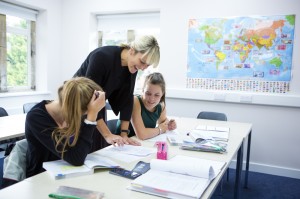 Olivera Raraty, Headmistress of Malvern St James Girls’ School, explains how choosing the right senior school will help to ensure future success for your child
Olivera Raraty, Headmistress of Malvern St James Girls’ School, explains how choosing the right senior school will help to ensure future success for your child
What is striking about the UK education sector is the number and diversity of schools available to choose from. Each school has its own unique feel, characteristics and personality and is as individual as each child that attends it. Whilst this is a positive as it offers a rich choice, it can almost feel overwhelming when you start the process of selecting a school for your child.
Added to this is the pressure to choose the school that will be absolutely right for your child. Each child will have his or her own strengths, interests and personality, so the child and the school need to gel. Where to begin?
The balance of boarding
Boarding schools come in all shapes and sizes. A good place to start in the selection process is to look at the balance of boarding in any given school. Is it a full boarding school, where every student – or an overwhelming majority – boards; if not, what is the balance between boarders and day pupils? Is the school rooted in the boarding culture, or are boarders a small community in a predominantly day school environment? Schools that offer full boarding or have a boarding culture often have very full weekday, weekend, and evening programs with a rich extra-curricular offer. However, if the majority of pupils are day students, or even weekly boarders, your child might occasionally be lonely at the weekend if there are not enough friends around to share experiences.
Another consideration is flexi-boarding. Some schools are offering this option as it fits in with modern family life and can offer the best of both worlds. Flexi boarding can be tailored to the needs of girls and their families. At my school, Malvern St James (MSJ), girls can flexi-board one, two or three nights per week. It is proving to be very popular, particularly with girls who are engaged in lots of after-school activities, those whose parents are balancing demanding jobs with family life, and for girls who may be international boarders but who have family (often grandparents) nearby, and wish to have the balance of boarding and family life at home. Flexi can also be a good choice for girls who wish to ‘dip their toe in the water’ and ease into full boarding life gradually.
Next, if your child is a full boarder, look at what activities – social, sporting, creative, and academic – are on offer in the evenings and at weekends. Some schools teach regular lessons on Saturday mornings, whilst others dedicate the whole weekend to extracurricular activities. What you need to think about is: is there enough overall that interests your child and will keep them stimulated? Will this be like a ‘home from home’?

The boarding house set-up
Look carefully at how the boarding houses are arranged in terms of age ranges and mix of children. What is the interaction between older pupils and younger? It is valuable for younger pupils to have role models in older children, and it is good for the older students to lead the way for younger. Ideally there will be a balance between how much time pupils spend with their own year group and with a broader age range.
It really is very important to understand the ethos and culture of the school and its boarding facilities. At some schools, house staff are also teaching staff, which arguably gives a holistic view of each child in a houseparent’s care. At others, house staff and teachers will be separate, making a clearer division between teaching and life in the houses although, in a good school, there will still be excellent communication between the two.
As well as boarding, it is essential to get a feel for the whole school community and how each part of it interacts. For example, are there separate day student houses or are day students attached to boarding houses? Do day students and boarders work together to form a strong community? How are competitions between the houses managed?
Transition
Consideration should be given to creating a smooth transition from prep to senior school, and then again to the Sixth form, as the ultimate priority will be to ensure your child is confident and secure about stepping up. It is a big move and it may weigh heavily on a child, particularly if this will also involve their first taste of boarding. Look at each school’s Admissions policy for the appropriate point of transfer, as this will tell you about the nature of the selection process and entry requirements.
In England, Wales and Northern Ireland, the majority of children will make the move at age 11 (Year 7) or 13 (Year 9). In Scotland, independent schools are generally more flexible about points of entry, but most pupils join senior schools when they are 12.
Parents should evaluate which will be the most natural time for their child in terms of their current academic framework at prep/primary school and their personal development. For example, in the state-maintained sector, the natural transition point would be Year 7 when all children move to Senior school, although they will not be making critical choices within the academic framework until Year 9 and GCSE options. In the independent sector, many boarding prep schools will run to Year 8, so parents will need to decide whether to transition early at Year 7 or to stay the full course. At MSJ, we cater to girls transitioning in Year 7, especially if they come from a school which only goes up to age 11, but I am also keen that, where they can, pupils stay on until the end of prep, so that they are able to enjoy their final years at the top of the school. Our structure at MSJ is such that we expect an intake in Year 9, and we see it as a very positive thing for the school culture.
Some children will join a boarding school at Year 12 for two years of A-level study in the Sixth form.
Whatever the entry age, schools will handle the transition process for new pupils in different ways. The best will provide taster days, and sleepovers so that parents and children can get a proper feel for the ethos of the school and whether they feel comfortable and happy there. There is nothing better than visiting the school for yourself if you are able to. All good boarding schools will have open days or will arrange individual visits when they will be delighted to welcome you.
 Size of school
Size of school
The shape and mix of a school is important. For example, is it large enough to sustain a full and varied activities programme; to give plenty of curriculum options; to offer a strong and healthy sixth form with a broad offering of subjects and enrichment opportunities that enables each pupil to follow his or her own interests and plays to individual strengths? A smaller environment may offer more interaction between year groups, build a stronger sense of community and cohesion where each pupil is better known, and naturally some children will feel more secure as a big fish in a small pond. Personally, I think that at about 500 students, the dynamics of a school change and this is the tipping point for feeling like a ‘large’ school.
The feel of a school can also be affected by whether it is a senior only or an integrated prep-to-senior school. This may also be a consideration for parents with more than one child who wish them to be at the same school.
Schools with international boarders should ensure that there is a balance of nationalities in the school as a whole and in individual boarding houses. It is not helpful to the pupils nor the larger community for there to be an imbalance. At MSJ, for example, we’ve worked hard to get the balance right, and our international students hail from more than 20 countries across the globe which means they speak English in the boarding houses and integrate in the life of the school.
Pastoral care
This is a critical area and a good school needs to demonstrate that they take their role in loco parentis seriously. Children need to be happy, secure and confident if they are to be fully ready to learn. Pupils should show strong relationships with their peer groups and teachers, housemistress and house staff. When you visit schools, I would recommend talking to pupils specifically about how they feel they are cared for; what happens if they are anxious or upset; who they can talk to about problems. All schools will have published guidelines on the behaviour they expect from pupils and how they deal with bullying and disciplinary issues, but touring a school and talking to pupils and house staff will give you a better understanding of how this works in practice.
 Academic culture
Academic culture
My advice here would be: approach league tables with caution! There are so many different criteria, so much data, and so many different ways to present and interpret it, that actually it can become almost meaningless. A significant number of schools have chosen, for this reason, not to publish their public examination results in national league tables. Instead, look at individual schools’ grades at GCSE and A-level; look at the universities and degree courses that pupils are moving on to; and if you can, look at the alumni and what they are doing and achieving. When you are looking around a school, ask sixth-formers whether they feel well prepared for university – this will be very telling.
To gain a real feel of the academic culture at the school, talk to pupils lower down the school about what they like about their lessons and learning. Do they feel stimulated, challenged and appropriately stretched? How is homework or prep balanced with their extracurricular interests? How do the teachers support their learning beyond the classroom? Are there drop-in sessions to support pupils if they feel they are floundering? What is the school’s approach to supporting pupils who are highly able and/or those with special educational needs? How is pupil effort and achievement recognised or rewarded? At my school, MSJ, our academic culture seeks to promote a growth mind-set. Girls are encouraged to think for themselves, to take intellectual risks and not to be afraid of failure, but to learn from mistakes as this encourages resilience, independence, and intellectual growth. At the same time, we provide a nurturing environment, which recognises that each girl will learn different topics or subjects at a different pace to another so we provide the necessary structures to support her learning and progress.
Curriculum
Find out about what subjects are available to all students, and what options are available for GCSE and A-level. Some schools will offer the International Baccalaureate (IB) as an alternative to A-level, but only a large sixth-form size can sustain this choice, and the IB does not necessarily suit all students. Schools may also offer the Cambridge Pre-U as an alternative to A-level, or the SAT necessary for entry to American universities. An increasing number of schools offer the Extended Project Qualification (EPQ), which leading universities value highly because it enables pupils to do independent research in a topic of their own choosing and can support their degree choice. There are other ways that schools can offer educational depth, for example via enrichment programmes and qualifications, Oxbridge preparation, university application preparation and other programmes to foster intellectual and creative development. Try to find out what opportunities there are for the curriculum to be personalised to your child’s particular interests, and at what level.
Sixth form
Some parents will have a long-term view of their child’s education, and others like to take one stage at a time. When it comes to Sixth form there is a choice of whether to stay in a school setting, or to move to an independent Sixth-form or Tutorial college. The challenge for schools is to make their Sixth form sufficiently different and exciting, and feel like it is a genuine ‘next step up’. I would recommend that parents ask lots of questions about the induction process, university preparation programmes, work experience opportunities and internships, and about leadership opportunities that encourage pupils to grow in maturity and responsibility – useful in itself, and potentially for university application and beyond.
Do look at examination results – they are, of course, important – and university destinations. But ensure that everything is not based on league tables. Sixth form, in particular, should develop the whole student, and work for the individual. Pupils should be allowed time to focus on what they are good at and enjoy. If your child has a keen interest outside of the academic arena – for example if they are a gifted sportsperson – this should be embraced and encouraged, alongside their studies.
Location
Think about location for a school like you would if you were buying a house. Somewhere safe and secure is an obvious starting point. Will the place offer opportunities as children grow up – for cultural events and fun things such as shopping and social venues like coffee shops, a cinema, etc – and is it safe for them to venture out in smaller groups or alone when they are older? Do you want your child to grow up in a city or in the country? Be careful not to be seduced by the rural idyll without thinking of the disadvantages – being in the countryside with little or no public transport may not be some teenagers’ idea of happiness. Check that your school provides transport to/from airports if that will be a requirement. Many schools will provide end/beginning of term transport to key UK hubs.
Communication with parents
When a child goes off to boarding school, it is often harder for the parent than it is for their offspring. Research whether your school has an open door policy; whether they have regular contact with parents with regard to the individual child, as well as whole-school/year-group/key-stage developments; and what technical facilities they have in place to support communications – for example parent portals, Skype, Wi-Fi. You can also find out how often and when you can contact your children directly – use of mobile phones, email and Skype has transformed keeping in contact with home for boarders. If you live abroad, you may also wish to use Skype to talk to staff about how your child is progressing and about any concerns.
 Narrowing the field
Narrowing the field
Do plenty of research using schools’ admission literature, talking to admissions offices, and talking to other parents for recommendations. And always visit if you possibly can (or at the very least have an agent visit). A shortlist of six schools to visit should be ample – otherwise the process can simply become overwhelming and exhausting (for you and your child). See what the arrangements are for visiting – does your child get to do a taster day and sleepover, do you get a tour of the houses, do you get to meet the head and the pastoral director? Will you and your child get to meet other pupils, including students from the same country? Bringing all of these elements together will give you a true reflection of a school and what it’s like to be there.
Finally, don’t lose heart. The process can be daunting, it can be exhausting, but any good school should go out of its way to help you and answer your questions. As Heads we understand that you are entrusting us with the thing most precious to you, and we are here to make the educational journey as rewarding, as interesting, and as valuable as it can be.